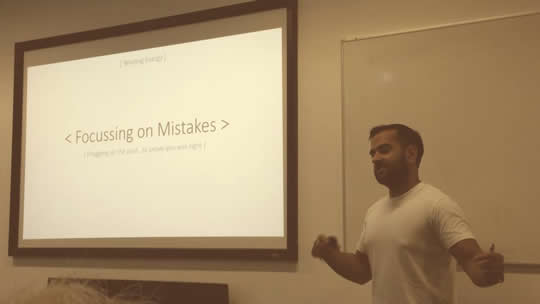
What does an MBA teach you? I have not done an MBA personally but I know it’s something that could have helped me and my business. The route I took was largely haphazard (although on paper it looks ‘logical’ and ‘well thought out’).
So, I did a BSc in Business Information Systems (2000-2003), after that I didn’t get a job because I didn’t look particularly hard for one. I also thought that jobs would come to me because of my shiny new degree. Anyway, after being ‘unsuccessful’ on the career front I decided to come back and do an MSc in Managing Information Technology (2003-2004). Once that was completed I still didn’t get a job as I didn’t really look for one (can you see a pattern emerging?), and I still thought it would just come to me.
I drifted along, spent a year or so selling stuff on eBay, and alongside doing that I ended up looking into Subway Franchises. Fast-forward to the end of 2005, I’d opened my first store at the age of 23 (I was the youngest franchisee in the UK at that point)… I didn’t really have any idea of what was going on or any kind of ‘masterplan’, I just kind of thought, “it doesn’t seem to be that difficult…I’ll just figure it out”.
A year or so after, I was asked by my masters dissertation supervisor ‘Ever thought about doing a PhD?’. I replied, ‘erm, no, I haven’t?’. Early 2007, I’d started doing a PhD (part-time). This was completed in (many many moons later) in 2014. During that time, I’d carried on messing about with the Subway thing and ended up with 7 stores by 2013 and became the largest non-corporate franchisee in Greater Manchester, and I was still one of the youngest franchisee’s (although my shoddy beard adds a few more years to my ailing carcass).
The point of this blog post is to share some of the lessons that I have picked up along the way; the things which have helped me pootle along with business, with my studies, and just life in general. These ten points are centred around how your emotions affect your thoughts which then shape your behaviour. It all sounds a bit ‘hippy-commune’ but it’s worth a ‘stare’… then again I am a bit biased toward it so I am going to say that. (It’s been broken down into two sections: things that are a waste of energy and things that you should not fear).
If you prefer, you can follow these points on my slides for “What an MBA Won’t teach you” via Slideshare, which I used when giving a talk at a Salford Business School Open Day session for MBA students.
The first lesson on wasting energy is –
1. Don’t try and change things that you can’t control
Learning to let go of things that you can’t control is one of the early decisions I had to make to ‘crack on’. It’s not possible to make every circumstance fit to how you ‘need’ to be or make everyone see things how you ‘want’ them to see it. Wasting energy trying to prevent ‘bad things’ from happening; thinking you’re able to ‘sort everything’ single-handedly, not delegating to others because ‘they can’t do it right’, or putting in serious effort into trying to get someone to change.
Let it go.
Learn how to prioritise tasks, make them fit around your schedule, and try not to flap about running from task-to-task on a first-come-first-served basis. Figuring out how to do this (and leave the things that don’t need your immediate attention to another day) is one of tools I used to make progress.
2. Don’t try and please everyone
Dr Jiten Makan – don't try to please everyone #mba #salfordopenday #salfordbschool pic.twitter.com/EeSPXicB8u
— Salford Business School (@salfordbizsch) September 9, 2015
It is important when dealing with other people to be transparent and do what is important for your business. As long as everybody knows what the rules and boundaries are, they can sign up for them or not.
A lot of people don’t necessarily know what they want, and you’ll find that some people often carry an agenda. If you try to please everyone by satisfying these “wants” you’ll eventually realise that they’ll change as quickly as they’re met. Focus on your business needs. Do what’s fair.
3. Get rid of the sense of entitlement
Business investments are never guaranteed – you need to be realistic, critical, and be honest with yourself. Just because you have invested £100,000 into something and you want it to work (obviously) it doesn’t mean it will.
You need to do your homework and be prepared to get your hands dirty – don’t sit and wait.
4. Don’t be impatient
Rome was not build in a day. When investing into a business, expecting an immediate return on your investment, a marketing campaign, or new ideas adds a layer of pressure that can drag your attention toward the wrong things. Expecting immediate results because you want them (or worse, you ‘need’ them to survive) is not a plausible strategy – it’s not X-Factor. Play the long game. Put the work in.
Three years is a good “rule of thumb” to start receiving return on investment (that’s why the banks use it), so get your finances to align with that.
5. Don’t dwell on mistakes
Recognise your mistakes, be critical, learn from them and move on. Endlessly agonising over the if’s and but’s of a bad situation will not only kill your energy, it’ll kill the energy of those around you.
Your mistakes can also come from your “wants”; believing something will work because you “want” it to; paying over the odds for a business because you “want” it (even though the finances don’t stack up).
Dr Jiten Makan sharing his lessons with MBA applicants #SalfordOpenDay
The Second Lesson: Things that you shouldn’t fear
I’m not suggesting that you adopt an ‘alpha male’ stance and beating your chest, tackling everything head on. Just be you. But learn how to be hard on yourself when you know you’re avoiding something that you shouldn’t. We know when we’re being a bit lame.
6. Don’t fear change
Change is inevitable so just get on with it. Be ready to adapt and find new ways forward for your businesses and yourself. I’m not suggesting that change is always good but it is always there. Deal with it. Usually the sooner the better.
7. Don’t fear “alone time”
It’s no surprise that some of the best thinkers were loners (Socrates, Newton, Kierkegaard). Find out what you really want and what is important for you personally – not what reality TV or some Instagram account is telling you.
Plot your moves, don’t just bounce about running off emotion and being driven by what everyone ‘else’ thinks.
8. Don’t fear to take initiative
Don’t fear to take initiative – always use it! Don’t be the person that gets stumped by the first hurdle, gives up, and starts wielding out the excuses…”my Sister’s gerbil ate the Ethernet cable and ….”.
When you have no-one holding your hand it all stops with you. Experiment and learn by doing, figure your way around the problem, and don’t be afraid to ask ‘stupid’ questions.
9. Don’t fear calculated risks
Dr Jiten Makan #salfordbschool #salfordopenday #mba talk pic.twitter.com/SWZ30UGhqL
— Salford Business School (@salfordbizsch) September 9, 2015
If it stacks up, seems plausible, and you’ve been critical and brutally honest with all the numbers, then go for it!
The good thing about getting involved when you’re younger is that you don’t have a lifetime of ‘worldly information or experience’ and so can’t endlessly – and often fruitlessly – consider the in’s and out’s of every situation trying to eliminate the risk. There’s a point where you’ve got enough information and just need to get on.
10. Don’t fear not being the “in” crowd.
Being you #MBA Dr Jiten Makan shares his business experience #salfordbschool #salfordopenday pic.twitter.com/FC1n59lGTP
— Salford Business School (@salfordbizsch) September 9, 2015
Don’t work around trying to impress other people, just stick to your values even if people get on your case. Have confidence in yourself and have the confidence to be you. It is true when its said that “those that matter don’t mind and those that mind don’t matter”. It is better to say you are not bothered or not interested or you are not convinced than it is to feign an interest.
Oh, and don’t let the “necessary evils” of business, study, or life command what you do.
Running your own business is an exciting proposition; it helps to get your mind-set right so that you don’t bounce about as an emotional wreck, burning bridges because ‘you’re having a bad day’. Stop being so dramatic. Take a step back, look at things logically, make a decision, and move forward.
When you know what you really want and what is important to you – identify with your strengths and your passions and bring them to what you do. See the things that hold you back and let them go. Be ruthless with yourself more than anyone else!
What does an MBA teach you?
Have you learned other important lessons from your MBA? Share your thoughts below.
